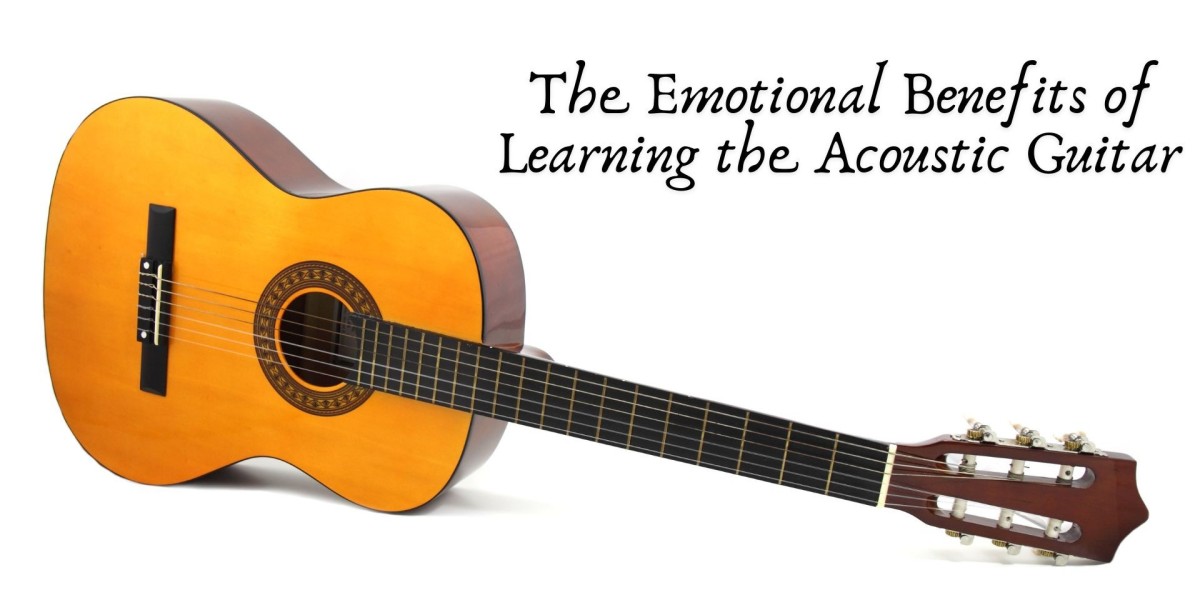Learning the acoustic guitar is more than just picking up a new hobby or mastering a musical instrument—it can be a deeply emotional journey. From stress relief to enhanced self-expression, the act of learning and playing the acoustic guitar brings with it a multitude of emotional benefits that can enrich everyday life. Whether you're strumming your first chords or writing original compositions, the acoustic guitar serves as a powerful tool for emotional well-being. This article explores the emotional advantages that come with learning this timeless instrument.
Stress Relief and Relaxation
In our fast-paced modern world, stress is almost inevitable. Learning the acoustic guitar offers a natural and accessible way to unwind. The act of strumming chords, practicing melodies, or simply focusing on the sound of the strings allows the mind to shift away from daily pressures. This mindful engagement triggers a relaxation response in the brain, reducing levels of cortisol (the stress hormone) and promoting a sense of calm.
Even beginners often report that spending just a few minutes playing guitar can lift their mood. This is because music activates the brain’s reward system, releasing feel-good neurotransmitters like dopamine and serotonin.
Emotional Expression and Processing
One of the most powerful aspects of the acoustic guitar is its ability to serve as a channel for emotional expression. Unlike words, music can express feelings that are difficult to articulate. Whether it's joy, sadness, longing, or hope, playing the guitar allows you to "speak" through your strings.
This emotional outlet is especially beneficial during difficult times. Writing a song after a breakup, strumming gently after a stressful day, or playing a cheerful tune when you're feeling upbeat can help process emotions in a healthy and productive way.
Increased Confidence and Self-Esteem
Learning any new skill can boost self-confidence, and playing the acoustic guitar is no exception. The sense of accomplishment that comes from mastering a chord progression, performing in front of others, or even just successfully following a song builds self-esteem.
As you continue to grow and develop your skills, you’ll likely begin to feel more comfortable expressing yourself creatively. This increased self-assurance can extend to other areas of life, helping you feel more confident socially, academically, or professionally.
Connection with Others
Music has an incredible way of bringing people together. Learning to play the acoustic guitar can open the door to new relationships and shared experiences. From jamming with friends to participating in open mic nights, the guitar becomes a social bridge.
This sense of community can provide emotional support and reduce feelings of isolation. Playing music with others fosters collaboration, empathy, and a shared sense of joy—all essential ingredients for emotional well-being.
Sense of Purpose and Motivation
Learning the guitar gives you something to look forward to and work toward. Having a consistent practice routine, setting musical goals, and tracking your progress can create a strong sense of purpose.
This purpose-driven approach enhances emotional stability, especially for individuals dealing with anxiety or depression. The structure and positive reinforcement from continued learning can provide motivation during tough times.
Mindfulness and Presence
Playing the acoustic guitar requires focus and concentration. When you're absorbed in playing a song or practicing a technique, you're fully in the moment—free from worries about the past or future.
This mindfulness practice is similar to meditation. It helps you develop greater awareness and reduces rumination, which can significantly improve emotional health over time. Each strum and chord becomes a meditative act that grounds you in the present.
Healing Through Creativity
For many, the acoustic guitar becomes a form of therapy. Music has long been used in therapeutic settings to support emotional healing. Creating your own music or interpreting existing songs allows for catharsis—a healthy release of pent-up emotions.
People coping with grief, trauma, or other emotional challenges often find that writing songs or playing music helps them process their experiences and begin to heal.
Joy and Fulfillment
At its core, learning to play the acoustic guitar brings joy. There’s a special kind of fulfillment in being able to play a favorite song or compose something original. The guitar provides endless opportunities for creative exploration and personal satisfaction.
This joy isn’t reserved only for experts; even beginners experience emotional upliftment simply from learning a new chord or finishing their first full song. The emotional rewards start early and grow with time and practice.
Conclusion
The acoustic guitar is more than just an instrument—it's a key to unlocking emotional well-being. From reducing stress and promoting mindfulness to enhancing self-esteem and fostering connection, the benefits are profound and far-reaching. Whether you're playing for yourself in a quiet room or sharing your music with others, the emotional enrichment that comes with learning the acoustic guitar is a journey worth taking.
So, if you've ever thought about picking up the guitar, know that you’re not just learning an instrument. You’re giving yourself a gift that can soothe your soul, brighten your days, and bring lasting emotional fulfillment.








